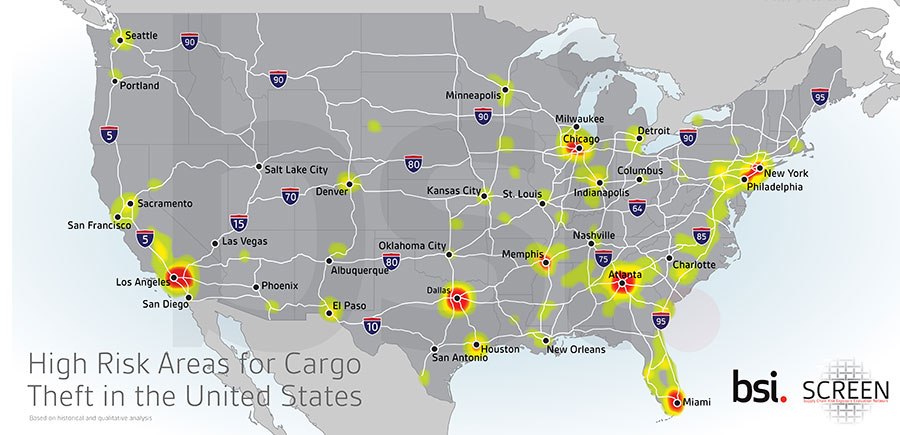BSI recently announced the latest findings from its quarterly review and outlook of the top global supply chain security, business continuity, food safety and fraud, and corporate social responsibility threats and trends.
BSI’s Supply Chain Risk Exposure Evaluation Network (SCREEN) Intelligence found that while COVID-19 matters remain a primary concern, the impacts created a number of additional disruptions and risks which are impacting supply chains, including cargo theft, smuggling, and child labor.
When BSI published its annual Supply Chain Risk Insights Report at the beginning of March 2020, the global business impact of COVID-19 was still in its initial stage. As BSI predicted, the outbreak has led to complex and varying responses by individual governments and businesses and has wreaked havoc on supply chain continuity.
BSI’s latest supply chain insights from SCREEN have found:
- An increase globally of illegal drug smuggling and cargo theft of pharmaceuticals and medical supplies
- A global increase of warehouse and facility theft, particularly throughout Europe as the world approaches peak shipping season
- An increase of human smuggling and stowaway incidents in supply chain modalities as many economies remain weak due to the impacts of COVID-19
- A continuation of transportation disruptions due to climate change and natural disasters
- Ongoing issues with food fraud due to global movement restrictions as a result of the impacts of COVID-19 on transportation
“As expected, COVID-19’s continued impact to the global supply chain remains significant,” said Jim Yarbrough, Global Intelligence Program Manager at BSI. “Unfortunately, we are seeing it’s most significant impact on vulnerable populations including migrant workers and children. For example, through the data collected by our SCREEN intelligence tool, we’ve found that COVID-19’s negative impact on global economies has led to exploitation of vulnerable migrants who may be stranded in detention centers due to mobility restrictions and an increased use of child labor due to lockdowns and school closures.”
Q4 peak shipping season to create global increases in cargo theft and drug smuggling.
Throughout the year, cargo theft continued globally. Several trends influenced Q3 this year including:
- An uptick in cargo theft incidents involving pharmaceuticals in Mexico
- Warehouse facilities were the most frequently targeted for cargo theft in Europe
- Food and beverage products were the most stolen commodities in Asia
- Thieves increasingly targeted medical supplies in the Middle East and Africa
- Rail freight theft in Mexico continues to pose a significant threat to supply chains in the country
- Since the lockdown in India, there is an uptick in cargo thefts, rebounding back to pre-COVID levels.
Weak economies due to COVID-19 contributing to human rights issues and supply chain challenges. Economic hardships worldwide hit migrants and children especially hard, with restrictions on movement stranding thousands. COVID-19 deterred some migration through border closures; however, the movement of migrants has continued, and stowaway detections picked back up during May/June. In addition, challenges of labor rights enforcement across Latin America and parts of Asia highlight the importance for organizations to monitor their supply chains to identify where typical factors that are conducive to labor exploitation may be.
This year, U.S. Customs and Border Protection (CBP) issued an unprecedented number of Withhold Release Orders over products believed to be produced with forced labor. Additionally, as the global pandemic and falling oil revenues challenge Gulf countries’ economies, many are responding by protecting their local labor markets, resulting in both opportunities and vulnerabilities for migrants.
Corruption by government officials was also a highlighted issue during Q3. In Mexico, the military took over customs administrations due to the high risk of corruption, although this is predicted to be a temporary fix for the problem. Similar issues of corruption occurred in supply chains throughout Q3 in Brazil and Thailand, with supply chain workers at ports participating in trafficking illegal drugs as well as border officials participating in illegitimate schemes.
Climate change and natural disasters create ongoing transportation disruptions and business continuity challenges.
Natural disasters posed a significant risk to supply chains in Q3, disrupting utilities, halting operations, and creating ground transportation delays. Persistent dry conditions in the northwest region of the U.S. will likely continue to contribute to the risk of wildfires throughout Q4. The formation of La Nina in the southwestern U.S., and a significant hurricane season, may exacerbate disruptions to supply chain transportation in these regions.
Exceptional flooding impacted South Asia this year, following a record setting year in 2019. Several countries experienced extensive flooding beyond seasonal norms resulting in port disruptions, submerged railways and roadways, and extensive agricultural damage. Flooding complicated the response to COVID-19 in South Asia, particularly in India, challenging social distancing and adequate evacuations in the Bihar region. In addition, the impact of climate change on business operations in Asia is increasing as these continued disasters erode resiliency and resources, especially considering many emergency funds were already spent on COVID response.

Global travel restrictions due to COVID-19 increase global food fraud incidents.
COVID-19 movement restrictions continue to drive food fraud trends in Latin America throughout Q3. Criminals in Latin America continue to smuggle and divert food products in large quantities, especially as certain types of goods increased in both value and consumption during the spread of COVID-19. It is likely that current border controls in many countries in the region are preventing the movement of passengers and smuggling of food products will likely continue as long as restrictions remain in place. In India, there was an uptick in food fraud during COVID-19 as lockdowns reduced access to food rations.
BSI’s Q4 report in January 2021 will define the 2020 trends and provide a forecast ahead of the annual Supply Chain Risk Insight Report to be released in Q1 2021.
Tony Pelli, Practice Director, Security and Resilience at BSI, told SCMR in an interview that shippers on the West Coast may be more vulnerable to cargo theft given the intensity of criminal activity targeting cargo near the port of LA-Long Beach, the busiest port in the United States.
“BSI has recorded losses of over $2 million in a single day in the greater Los Angeles area, and California typically leads the United States in terms of the proportion of cargo thefts BSI records,” he says. “Cargo thieves are known to conduct full truckload thefts in the LA area, including fictitious pickups, where thieves pose as or steal the identities of legitimate trucking companies and falsely pick up loads in their name.”
He adds that aside from LA, Oakland also saw an increase in cargo thefts in 2019 that has continued into this year.
“Thieves have also been known to target agricultural shipments leaving farms in the Central Valley. For example, BSI recorded the theft via fictitious pickup of $350,000 of pistachios in Terra Bella, California in late August.”
SC
MR


Latest Supply Chain News
- How CPG brands can deliver on supplier diversity promises
- How S&OP provides the answer to in-demand products
- AI, virtual reality is bringing experiential learning into the modern age
- Humanoid robots’ place in an intralogistics smart robot strategy
- Tips for CIOs to overcome technology talent acquisition troubles
- More News
Latest Podcast

 Explore
Explore
Business Management News
- How CPG brands can deliver on supplier diversity promises
- How S&OP provides the answer to in-demand products
- AI, virtual reality is bringing experiential learning into the modern age
- Tips for CIOs to overcome technology talent acquisition troubles
- There is still work to do to achieve supply chain stability
- Blooming success: The vital role of S&OE in nurturing global supply chains
- More Business Management
Latest Business Management Resources

Subscribe

Supply Chain Management Review delivers the best industry content.

Editors’ Picks





